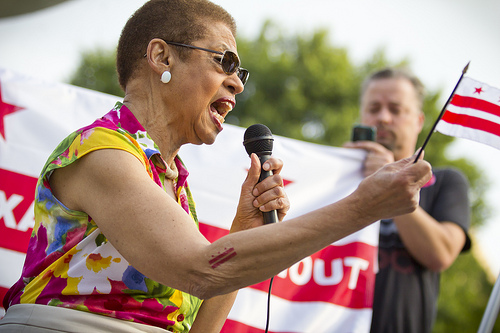Rep. Ed Markey of Massachusetts was elected to the Senate last month, setting off a chain of events that has led to the appointment of a new ranking member of the Highways and Transit Subcommittee in the House. That new ranking member is DC Del. Eleanor Holmes Norton.

The path from Markey’s victory to Norton’s ascension is a circuitous one. (Larry Ehl did a great job laying it all out a few months ago on Transportation Issues Daily.)
Markey’s move to the Senate opened up the ranking member position on the House Natural Resources Committee. Rep. Peter DeFazio of Oregon was number two there and jumped on the top slot when it opened up. (His departure from the Democratic leadership on transportation is a loss for reformers, as he was a tireless advocate for transit, active transportation, and a strong federal role in transportation funding.)
House Democrats don’t allow members to hold the top position on more than one committee, so DeFazio had to drop his ranking membership on Highways and Transit. Ehl speculated in May that Norton was “very unlikely” to jump on the vacancy, even though she was next in line in terms of seniority, since she would have to drop her ranking membership on the Economic Development and Public Buildings Subcommittee to take it. But she went ahead and did it, and it's a good thing she did. Eleanor Holmes Norton will be an excellent Highways and Transit ranking member. Here’s why.
On the Highways and Transit panel, Norton is way more Transit than Highways. While DeFazio had a serious soft spot for sustainable transportation, the fact is that his large and mostly rural district relies primarily on roads. Eleanor Holmes Norton’s district -- the entire District of Columbia -- is entirely urban. DC is home to the second-busiest transit system in the nation, after New York’s subway. Thirty-eight percent of DC residents commute to work on public transportation. Plus, the DC area comes up for public scorn every year when its roads are ranked the most congested by the Texas Transportation Institute. The economic vitality of Norton’s district relies in no small measure on high-quality transportation options.
That reality isn’t lost on Norton. She’s fought to bring the tax benefit for transit commuters up to the same level drivers enjoy, calling it “insane to incentivize by almost two to one the use of cars over mass transportation to get to work.”
“Some do not care as much about the serious health and environmental effects as I do,” she said, “but everybody cares about being stuck in traffic.”
She’s been a supporter of public transportation incentives for federal employees, which, she said, have worked great to get those workers to "hop on" buses and trains. “Boy have they done it,” she said. Increased ridership from DC’s large cadre of federal employees ended up contributing to overcrowding and overuse of the system, giving Norton justification to ask Congress for federal money to help Metro keep up with the increased ridership. In 2008, she convinced Congress to grant $1.5 billion over 10 years for improvements and repairs to the Washington Metro system. And she has managed to squeeze the $150 million appropriation out of Congress each year, despite serious fiscal challenges.
Norton co-sponsored an ultimately unsuccessful bill to help transit agencies with the rising price of fuel. The bill also would have established a vanpool pilot program, increased federal funding for park-and-ride lots, and implemented a national public awareness program about the environmental, energy and economic benefits of public transit. When speaking for the bill, Norton called public transportation “the only available remedy” to shield Americans from the pain of high gas prices. “Wherever you stand on offshore or on Alaska, this is the only way to have an effect tomorrow,” she said. “There’s only one 'tomorrow' remedy and that is this public transportation remedy.”
That bill passed the House 322 to 98 but died in the Senate.
As far back as 2008, Norton was pointing out the fact that the American people were “leading” the way by driving less and taking more trips on public transportation.
She’s focused on rail and transit safety, introducing a bill to increase funding for security after 9/11. (The bill didn’t go anywhere.) She intensified her focus after a Metro crash in 2009 killed nine people.
Being the highest-ranking member of the minority party can be a thankless job. Former T&I Chair John Mica shut Democrats out of every major action the committee took. Rep. Bill Shuster appears to be striking a more collaborative tone. But still, it's the ranking member's job to insert the minority view when possible and go on the attack when not. Luckily, Norton has never been shy about speaking her mind.
Norton was a conferee when MAP-21 was negotiated, although House Democrats were almost completely sidelined in what became a bilateral compromise between Senate Dems and House Republicans. She looks forward to serving as ranking member of Highways and Transit during the next reauthorization debate.
Norton has served on the T&I Committee the entire 22 years she’s been in Congress. Since the District of Columbia is not a state, Norton doesn’t have a vote on the House floor -- meaning DC residents are the only U.S. citizens without full representation in Congress. But Norton can vote in committee, making her committee assignments especially key to her effectiveness as a legislator.





